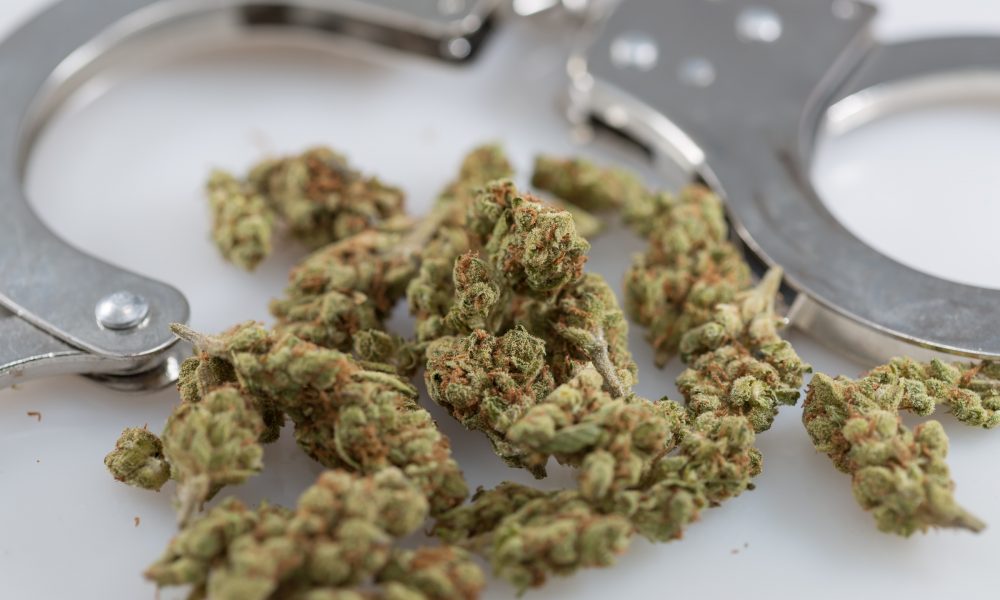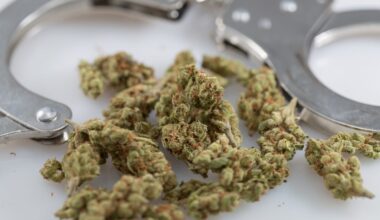Bipartisan Wisconsin lawmakers on Tuesday unveiled a bill to decriminalize marijuana possession, a notable development in a state where cannabis reform has consistently stalled in the GOP-controlled legislature despite support from the Democratic governor.
Reps. Shae Sortwell (R) and Sylvia Ortiz-Velez (D) are sponsoring the legislation in the Assembly, with a companion bill being led in the Senate by Sens. Kathleen Bernier (R) and Lena Taylor (D). There are currently about a dozen cosponsors attached to the proposal across both chambers and parties.
At a time when more and more local Wisconsin jurisdictions are independently enacting cannabis reforms, this bill seeks to standardize decriminalization at the state level. That said, some advocates have pointed out that, in doing so, it may undermine some city policy changes by mandating higher fines than are now currently in effect.
The measure would make it so possession of up to 14 grams of marijuana would be punishable by a $100 civil fine without the threat of jail time under state law for a first offense.
Importantly, the bill would also eliminate “counting” of offenses if they involve 28 grams of cannabis or less, meaning people would not be subject to enhanced penalties for repeat offenses.
While it remains to be seen whether the legislature will have the appetite to advance the measure, the sponsors say they’re working to strike a balance between legalization—as the governor, advocates and some legislators want—and the status quo of criminalization.
—
Marijuana Moment is already tracking more than 1,200 cannabis, psychedelics and drug policy bills in state legislatures and Congress this year. Patreon supporters pledging at least $25/month get access to our interactive maps, charts and hearing calendar so they don’t miss any developments.![]()
Learn more about our marijuana bill tracker and become a supporter on Patreon to get access.
—
“Trying to bring together different areas of the state and different political perspectives can be difficult on any issue, and particularly on this one,” Sortwell said at a press conference on Tuesday.
“I know I’ve spoken with some really hardliners who want to continue to make sure that this is completely illegal, want to leave it at felony levels for everything, really crack down hard on the usage of it,” he said. “And then we’ve got some people on the other end of the political spectrum that want full legalization, want it regulated like alcohol.”
“I believe this bill that we have put together does our best to pull together the best of both worlds, trying to bring together all perspectives across the state to try to find some sort of middle ground where we can move forward,” the representative said.
Local governments would have some flexibility in setting their own policies, but they could not impose a civil fine of less than $100 or more than $250 for low-level possession. And courts could choose to impose a minimum of 16 hours, or a maximum of 40 hours, of community service in lieu of a civil fine.
While advocates are still pushing for comprehensive legalization—and a trio of senators announced the filing of a bill to accomplish that in August—this reform would at least help address the punitive approach that Wisconsin has taken to cannabis.
As it stands, marijuana possession is punishable by a maximum $1,000 fine and up to six months in jail for a first offense. People convicted of a subsequent offense would face a felony charge punishable by a maximum $10,000 fine and up to three and a half years in prison.
However, there is a complicating factor in the new bill. The discretion that local municipalities would be afforded is limited, and it appears the legislation could actually lead to increased civil penalties in cities that have imposed much lower fines for possession. In Milwaukee, for example, the fine is set at $1, while the new measure would require that to be increased to $100.
“We know that by putting this bill into effect that we can get rid of that patchwork at the local ordinances in different areas. We can set a standard across the state,” Ortiz-Velez, who also championed local reform as a Milwaukee County supervisor, said. “I look forward to this bill having a hearing to hear the people of Wisconsin get to weigh in on this matter.”
The new decriminalization bill would also reduce penalties associated with paraphernalia—making the penalty a $10 civil fine instead of a maximum $500 fine and up to 30 days in jail.
“The bill also specifies that a citation issued for possession of marijuana or marijuana paraphernalia must contain provisions for a deposit in lieu of a court appearance,” according to a legislative analysis. “The court may consider the deposit as a plea of no contest and enter a judgment without the person appearing in court.”
Police would also have some discretion under the legislation. They wouldn’t be required to take a person to jail, book them or take their fingerprints for cannabis possession; they would simply need to collect basic personal information including the person’s name and address.
Finally, the legislation also provides liability protections for employers who choose not to drug test most workers for THC. There are some exceptions, including companies that are contracted with the federal Department of Transportation.
Sortwell said at Tuesday’s press event that he’s spoken to Assembly Republican leadership about the proposal and “they didn’t give me a ‘no,’ so I take that as a win.”
“They didn’t give me a ‘no,’ they didn’t give me a ‘yes,’” he said. “They took it under advisement.”
Wisconsin Gov. Tony Evers (D) is a supporter of legalization and complained in April that he was “tired” of hearing about sales figures from his neighbor’s adult-use market, joking that Illinois Gov. J.B. Pritzker (D) “thanks me for having Wisconsinites cross the border to buy marijuana.”
Evers tried to legalize recreational and medical marijuana through his proposed state budget earlier this year, but a GOP-led legislative committee stripped the cannabis language from the legislation in May. Democrats tried to add the provisions back through an amendment the next month, but Republicans blocked the move.
Other Republican lawmakers have filed bills to more modestly decriminalize marijuana possession in the state, but none of those proposals advanced during this year’s session.
Evers held a virtual town hall event in April where he discussed his cannabis proposal, emphasizing that polling demonstrates that Wisconsin residents back the policy change.
Locally, Wisconsin voters in three jurisdictions last year approved non-binding advisory questions in favor of marijuana legalization. Those moves came after Wisconsinites overwhelmingly embraced cannabis reform by supporting more than a dozen similar measures across the state during the 2018 election.
Late last year, city officials in the state’s capital, Madison, voted to remove most local penalties for cannabis possession and consumption, effectively allowing use by adults 18 and older.
Again, that policy change could be impacted if the new bipartisan bill is enacted as introduced, potentially requiring Madison to impose a $100 fine for possession of up to 14 grams.
Read the text of the bipartisan marijuana decriminalization bill that the Wisconsin lawmakers introduced below:
First Responders No Longer Disqualified For Past Marijuana Use In Austin
Medical Disclaimer:
The information provided in these blog posts is intended for general informational and educational purposes only. It is not a substitute for professional medical advice, diagnosis, or treatment. Always seek the advice of your physician or other qualified healthcare provider with any questions you may have regarding a medical condition. The use of any information provided in these blog posts is solely at your own risk. The authors and the website do not recommend or endorse any specific products, treatments, or procedures mentioned. Reliance on any information in these blog posts is solely at your own discretion.






